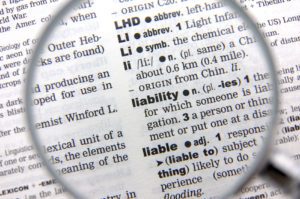











A party can be held financially liable for injuries and damages they cause to another person. In legal terms, liability is a claim against another party’s assets. You establish liability in a personal injury case by proving that another party injured you through negligence.
There are several standards of liability that may be used in a personal injury lawsuit, depending on the case’s facts and circumstances and the applicable tort laws.
There are generally five types of liability that apply in personal injury cases:
General negligence is the most common legal cause of action for personal injury claims. Negligence is failing to act with the same level of care that a reasonably prudent person would have used under similar circumstances.
Proving negligence requires you to establish:
Negligence claims include most motor vehicle accidents, slip and falls, premise liability cases, medical malpractice, and other cases.

In some cases, an injury victim does not need to prove negligence for a party to be liable for their injuries. Strict liability holds a party accountable for damages if a party engaged in certain prohibited conduct and caused injury.
Strict liability is often used in a product liability case. For example, designers and manufacturers can be held strictly liable for damages caused by defective products. Strict liability also applies in cases involving dog bites, wild animals, and abnormally dangerous activities.
Contributory fault is a way to apportion damages in a personal injury case. Massachusetts uses a modified comparative negligence law. If an injured party is more than 51 percent at fault for the cause of their injury, they are barred from recovering any money for their damages.
If they are less than 51 percent at fault, they can recover money for damages. The amount they receive is based on their percentage of fault. If the other party is entirely at fault, the injured party may receive up to 100 percent of the value of their damages.
However, if the injured party is partially at fault, their compensation is reduced by their percentage of fault. For example, if you were 40 percent at fault for a slip and fall accident, the most you could receive is 60 percent of the value of your damages.
Under the theory of vicarious liability, a third party could be held liable for damages caused by another party. For example, vicarious liability is often used in cases involving an accident caused by an employee.
Suppose a truck driver causes a truck accident. In this case, the trucking company may be liable for damages. Likewise, say an employee spills hot soup on a customer. In this case, the restaurant owner may be liable for damages.
Importantly, the employee must have acted within the scope of employment for the employer to be vicariously liable for damages.
Negligence per se shifts the burden of proof from the plaintiff to the defendant in a personal injury lawsuit. This theory applies when a defendant violates a safety law designed to protect specific categories of people from certain types of injuries.
For negligence per se to apply, the law must protect a general public interest and carry a penalty for violation. Drunk driving accidents are an example of negligence per se cases.
If a party is negligent in causing your injury, you could receive compensation for your:
The amount of your compensation depends on the facts of the case, including the strength of your evidence proving liability. Working with an experienced Boston accident lawyer can improve your chance of recovering fair compensation.
You deserve to be compensated fairly for damages caused by a negligent party. However, insurance companies and at-fault parties are often unwilling to negotiate a reasonable settlement.
The Boston personal injury lawyers of Sweeney Merrigan Law, LLP, can help you. We aggressively pursue personal injury claims to recover the maximum compensation available for our clients.
Get the legal advice you need to protect your best interests. Contact our law firm today to request your free consultation with an experienced personal injury lawyer in Boston, MA.
We use cookies on our site to analyze traffic, enchance your experience, and provide you with tailored content.
For full functionality of this site, you must consent to the use of cookies. For more information or to opt out, visit our privacy policy